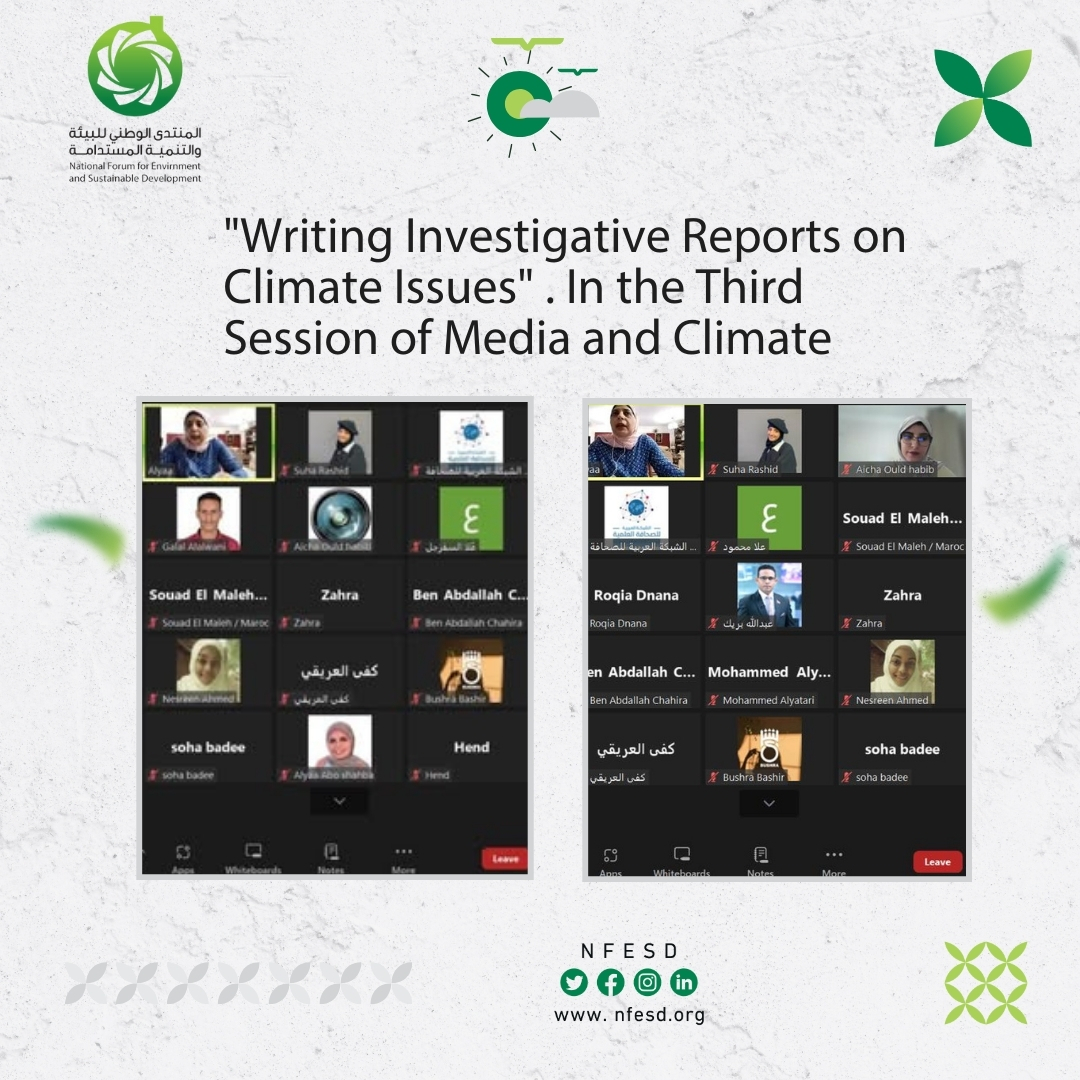Writing Investigative Reports on Climate Issues” . In the Third Session of Media and Climate
Saturday, August 24, the third session titled “How to Write Investigative Reports on Climate Issues?” took place as part of the Media and Climate Program. This program is implemented by the National Forum for Environment and Sustainable Development (NFESD) in collaboration with the Humanitarian Journalism Foundation and the Arab Network for Scientific Journalism.
The session was opened by investigative journalist Aliyah Abu Shehab, who has won the Africa21 Award for Best Media Coverage of Biodiversity. She began her discussion by defining investigative journalism, outlining the fundamentals of investigative reporting, the six essential questions for preparing investigations, and the differences between regular journalism and investigative journalism.
Abu shehab added, “There are significant dzfferences between investigative journalism and regular journalism. In investigative journalism, information cannot be published until the sources are verified, connected, and complete. A journalistic story contains the maximum amount of information, which may be extensive, and since an investigative report requires documentation to support or refute source statements, this contrasts with traditional journalism.”
Abu Shehab emphasized the necessity of focusing on the question of “Why?” in investigations, the accuracy of information, the importance of understanding the journalistic story, developing a systematic approach for the journalist, selecting sources carefully, ensuring the correctness of information, and recognizing the subject of the investigation’s accountability and oversight.
Regarding the differences between sources in regular journalism and investigative journalism, she stated, “In investigative journalism, one cannot assume trust in sources or use information without verification.” She noted that investigative errors are completely unacceptable in investigative work and reflect poorly on the journalist and their media outlet.
She also stressed the importance of preparing a hypothesis for the investigation, which is fundamental before starting the investigative work. This hypothesis should consist of an action, a subject, and an object, and must be based on indisputable facts.
she stated, “It is crucial for the journalist to be rigorous in assessing information and to verify details when communicating with someone claiming knowledge of corruption, as they may provide false information to harm someone.”
Abu Shehab continued by highlighting the significance of time management, maintaining investigation diaries, focusing on news, and utilizing social media without underestimating its value. She recalled the importance of original sources of information and secondary sources that may serve as primary sources, according to her.
She added, “There must be strong and sufficient evidence for everything mentioned in the investigation regarding violations, and one should be familiar with the law, the constitution, regulations, and written procedures.”
According to Abu Shehab, the biggest mistake a journalist can make is generalization, which leads to unnecessary effort, wasting time, and failing to serve the investigative story.
She recounted the stages of investigative journalism, stating, “They begin with observation and ideas, followed by preliminary research, then formulating the hypothesis, gathering studies, conducting interviews, writing the first draft, documenting information, and revising and editing.”
Regarding how to generate ideas for investigative reports, she suggested tracking environmental policies and funding through sources of scientific research financing, as well as following reports issued by global organizations and environmental associations.
In conclusion, Abu Shehab spoke about climate change and the effects that have led to environmental changes and their impacts on humans, agriculture, living organisms, and various aspects of life, such as flooding, plastic waste, drying and pollution of lakes, among other causes.
This session is the third in a series under the Media and Climate Program hosted by the National Forum for Environment and Sustainable Development (NFESD) in collaboration with the Humanitarian Journalism Foundation and the Arab Network for Scientific Journalism.

